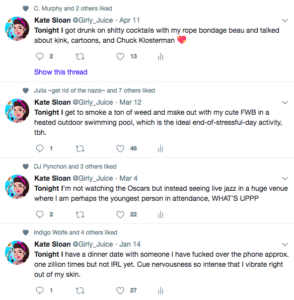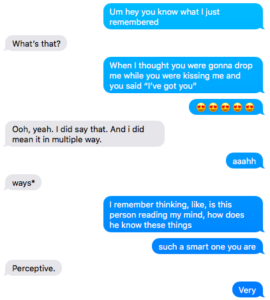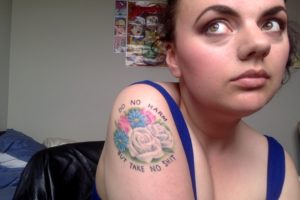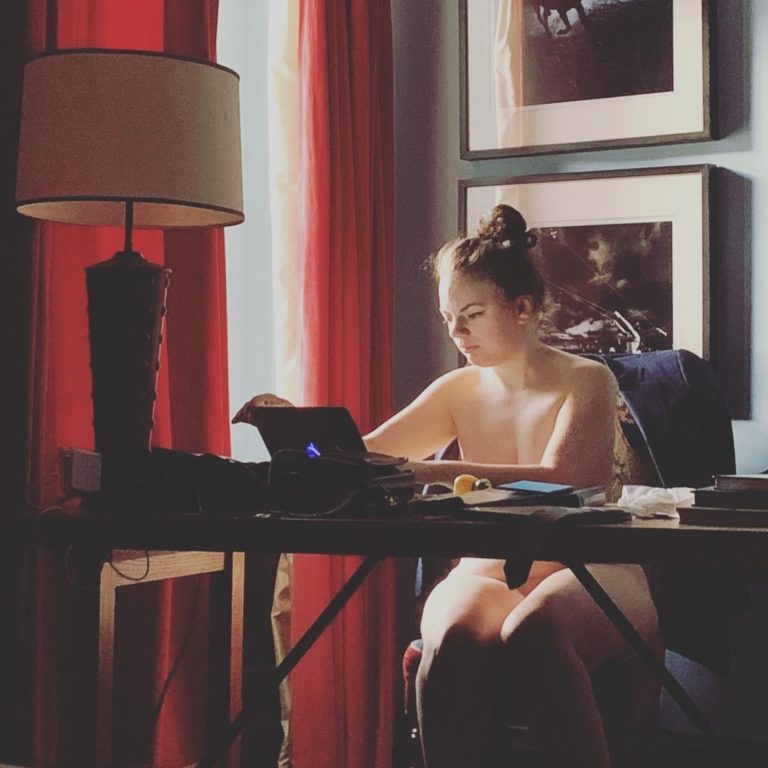
Friends, this blog is SEVEN YEARS OLD today, and that feels absolutely wild to me. I was not always the delightfully busy, proverbial-phone-ringing-off-the-hook sex writer you see before you. Even people who seem like they sorta “have their lives together” had to start somewhere. I’ve read my hero Alexandra Franzen’s post “A chronology of my life as a professional writer” many times seeking answers and comfort, at times when it seemed like the writer thing just wasn’t going to work out… and so it feels like good scribe karma for me to explain, in a similar fashion, how I got to where I am now. As the youths are saying on Twitter nowadays: Buckle up.
2000 or thereabouts. I am a voracious bookworm, a semi-closeted nerd, a precocious weirdo at age 8. I spend hours chronicling my days in my Little Mermaid journal – and, secretly, penning erotica in my ornate Anne of Green Gables journal. Later, I will rip all the filthiest pages out in a bout of shame – but for now, the anatomically ill-informed trysts on those pages fill me with joy.
2006. I’m knee-deep in a musical theatre obsession, and believe, genuinely believe, I will be a Broadway performer someday. I devour all the books I can find on the subject – Audition, Making It on Broadway – and go to voice lessons and memorize monologues and make lists of my dream roles. One night, at a family party, during a discussion of all the kids’ various ambitions, my wise older cousin turns to me and says, “I think Kate will grow up to be a writer.” I laugh, because she’s wrong: clearly I’m going to be singing and dancing on Manhattan stages instead. Right?
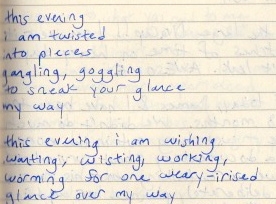 2009. My (hot, British) English teacher pulls me out of science class to tell me my recent essay for him was exemplary and that he wants to use it in future lessons. My glee cannot be quantified. That same year, I win first prize in a student poetry contest, and I get to read my extremely gay poem onstage in front of a bunch of literary types. They give me a $100 bookstore gift card which I promptly spend on a lot of Bukowski.
2009. My (hot, British) English teacher pulls me out of science class to tell me my recent essay for him was exemplary and that he wants to use it in future lessons. My glee cannot be quantified. That same year, I win first prize in a student poetry contest, and I get to read my extremely gay poem onstage in front of a bunch of literary types. They give me a $100 bookstore gift card which I promptly spend on a lot of Bukowski.
2010. I take a Writer’s Craft class where I get to explore various different forms, ranging from Shakespearian verse to sitcom scripts. Later, one of my favorite teachers lets me take a one-on-one literature/creative writing class with her, tailored to my tastes and goals as a reader and a writer. She assigns me twisted fairytales, feminist essays, Angels in America. I write a play about romance, non-monogamy, and gender confusion, and they do a staged reading of it at my school’s Fringe Festival. I cry a lot in the aftermath, having heard my words in other people’s voices and been utterly lit up by it.
2011. That same teacher recommends me to Shameless magazine as someone they should profile, and they do. It’s my first appearance in a magazine, albeit not a byline. The article captures my frazzled artistic life at the time: improv, painting, poetry. I’m still not settled on the “writer” identity, though I’m getting there.
Early 2012. I take a year off between high school and university, trying to figure out what the hell I want to study. One night, at my commencement, I’m mesmerized by the ASL interpreter onstage, and ponder whether I should go to school for ASL translation, something I’ve often idly thought I might enjoy. But then I realize it would probably be best if I studied something I already know I enjoy and am good at… like… writing. Something clicks. I race home that night and write in my notebook: “MAYBE I SHOULD GO TO JOURNALISM SCHOOL??”
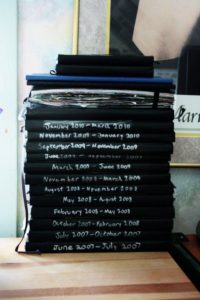 March 2012. I apply to a shitty retail job at a sex shop. I do some Googling about sex toys to make sure I know my shit incase they call me in for an interview – but they don’t. However, in the process, I discover sex toy reviewers like Epiphora and Lilly, and I think, “Hey, I could do that.” I start a Tumblr-hosted blog. I name it Girly Juice. “Could be a fun summer project,” I note in my journal.
March 2012. I apply to a shitty retail job at a sex shop. I do some Googling about sex toys to make sure I know my shit incase they call me in for an interview – but they don’t. However, in the process, I discover sex toy reviewers like Epiphora and Lilly, and I think, “Hey, I could do that.” I start a Tumblr-hosted blog. I name it Girly Juice. “Could be a fun summer project,” I note in my journal.
April 2012. The owner of a website called Sex Toys Canada reaches out to inquire about a partnership. I’m still new to the sex toy reviewing game, so I eagerly negotiate a deal whereby I will get $140 in store credit each month in exchange for writing 2 articles for the company blog. I acquire my first “free” toys, including an Eroscillator, and feel like a business genius. (Over a year later, I will renegotiate and get them to start paying me in actual money. Only $50 an article, but still.)
September 2012. I start classes at Ryerson University’s School of Journalism. It’s hard – especially “streeters,” where you have to interview random people on the street for a story, the bane of my socially anxious existence – but I feel invigorated and inspired by the smart writers who surround me and the wonderful work I get to read every day.
2013. I get an unpaid internship writing and editing articles for a dating newsletter aimed at middle-aged women. A recommendation letter from my supervisor at the end of the summer says that I have “excellent written and verbal communication skills, [am] extremely organized, can work independently, and [am] able to effectively multi-task to ensure that all projects are completed in a timely manner.” I try to parlay the internship into a paying position, but they don’t go for it – probably, in retrospect, because their economic model hinged on not needing to pay people like me.
2014. I’m invited to write some pieces for on-campus publications, the Eyeopener and the Ryerson Folio; far from limiting me, my sex “beat” just makes people think of me first when they need a sex story written. A J-school colleague of mine interviews me for a story she’s writing for Herizons magazine about labiaplasty. In seeking out the mag so I can read the story, I realize they’d be a great fit for lots of the stuff I like to write about. I pitch the editor a feature story about toxic sex toys, and she loves it. My friends and family rejoice supportively about my magazine debut, a heavily-reported story called “The Greening of Sex Toys.”
2015. I attend a sex bloggers’ retreat called #DildoHoliday, and teach a workshop on generating content ideas and staying on task, since I am, according to one of the retreat organizers, “the queen of productivity.” Throughout the year, I’m interviewed for the University of Toronto campus newspaper, the Offleash podcast, Kinkly’s Sex Blogger of the Month feature, and Sex City Radio. Everyone seems suddenly interested in this weird sex writer girl.
 Early 2016. I do my final-semester internship at the Plaid Zebra, where they let me write about sexual health, social psychology, and dick tuxedos. It gives me a taste of what it might be like to be a full-time staffer at a publication – and I discover that I think I’d rather freelance. I take a gig writing monthly articles for a sex toy shop’s blog, to supplement my growing income from blogging and journalism.
Early 2016. I do my final-semester internship at the Plaid Zebra, where they let me write about sexual health, social psychology, and dick tuxedos. It gives me a taste of what it might be like to be a full-time staffer at a publication – and I discover that I think I’d rather freelance. I take a gig writing monthly articles for a sex toy shop’s blog, to supplement my growing income from blogging and journalism.
July 2016. I pitch an essay to the Establishment about dating faux-feminist men. They accept it, I write it, and… it goes viral. For several days, I basically cower in my bed, overwhelmed by the onslaught of tweets and trolls and threats. I wonder, many times, if the sex-writer life is really for me. I conclude that it is.
Early 2017. I work a sex toy retail job, briefly, before they fire me for no real reason. At first I panic about how I’m going to make ends meet, but then somehow the sponsored post requests and freelance story assignments pour in at exactly the right moment. The sex and relationships editor of Glamour reaches out via DM to say she loves my blog and would welcome any story pitches from me. I write for her – and Teen Vogue, and the Establishment, and Daily Xtra. I dutifully update my portfolio every time a new piece goes up. The Daily Mail writes about what a slut I am, and I’m terrified it’ll incite the trolls again, but it doesn’t, not really.
June 2017. I start my new dayjob as a social media writer for a firm that works with adult-industry clients. It’s 10-15 hours of solitary, largely self-directed work per week. The steady work allows me to relax and not worry so much about whether my more creative work will be able to support me. I stop shopping for button-downs and pencil skirts in a gesture of supplication to some future office-job self; I accept that maybe I am just A Person Who Works From Home Now, and that therefore it’s okay for me to buy star-print leggings and sparkly T-shirts instead.
 Early 2018. A Spanish newspaper calls me “the Canadian Bridget Jones.” At my boyfriend’s urging, I pitch a story to a dream publication of mine, Cosmo, and they say yes. When it goes up, my perfect brother tweets, “My sister is now a Cosmopolitan-featured writer!” and I don’t quite believe it until I see his words.
Early 2018. A Spanish newspaper calls me “the Canadian Bridget Jones.” At my boyfriend’s urging, I pitch a story to a dream publication of mine, Cosmo, and they say yes. When it goes up, my perfect brother tweets, “My sister is now a Cosmopolitan-featured writer!” and I don’t quite believe it until I see his words.
Late 2018. I win an award from the Association of LGBT Journalists. I get nominated for Best Blogger in NOW magazine’s Readers’ Choice Awards. I write big meaty reported pieces for The Walrus and an op-ed for Herizons. I sell several sponsored posts a month, and do odd jobs copywriting and ghostwriting for various sex shops, dating sites, porn sites, and adult content creators. I do my best to follow Alex Franzen’s advice: underpromise and overdeliver. Then I’m invited to teach a sex writing class at the Naked Heart Festival and it validates me, affirms me. This is really my career. Wow.
2019. Herizons offers me a column; I accept. I do more copywriting and ghostwriting and social media writing. I pitch, and write, and network, and brainstorm. The sex writer life, to my delight, goes on.
Big takeaways, if I had to choose a few:
- Even if your heart is in a particular genre of writing, consider branching out into other areas. I wouldn’t be able to do my fun, creative blogging and essay-writing if it wasn’t supported at least some of the time by social media work, promotional copywriting, etc. – not to mention, going outside your comfort zone helps stretch your creative muscles.
- Pitch, pitch, pitch, and pitch some more. Pitch publications you would love to write for, not just ones you think would “let you” write for them. Aim high!
- Getting paid for your writing – particularly blogging – can be a slow, long haul. Don’t expect anything to happen overnight. It is more than okay to supplement your income with a dayjob along the way, and even once you become more established. We all gotta eat.
- Trolls, h8erz, and rejection letters from editors can all feel much bigger and more important than compliments, fan letters, accolades, and achievements – but they’re not. Do your best to let setbacks fade into your history; they don’t have to define you, as a writer or as a person.
Thanks for being here! It’s been a pleasure spending seven years with you – or however long you’ve been around. ❤️
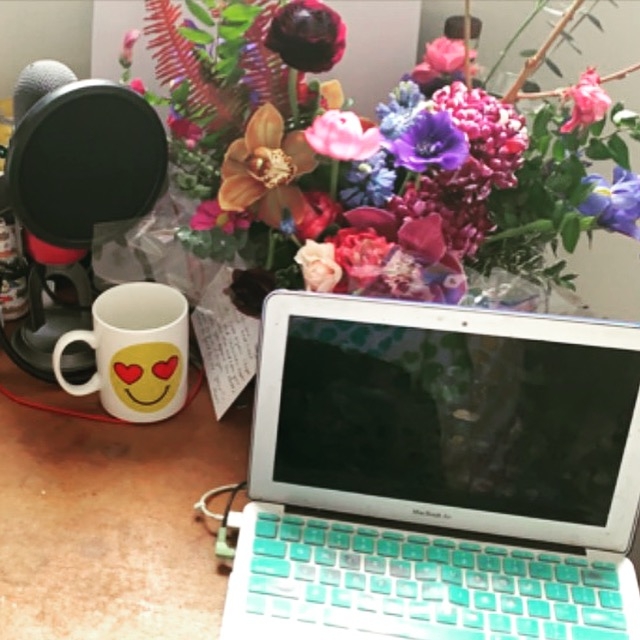
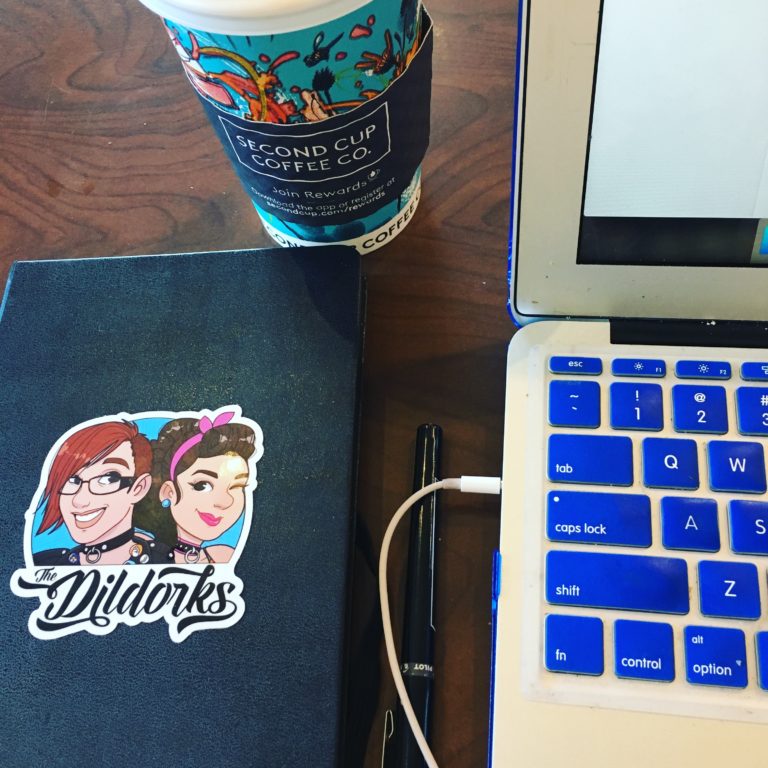
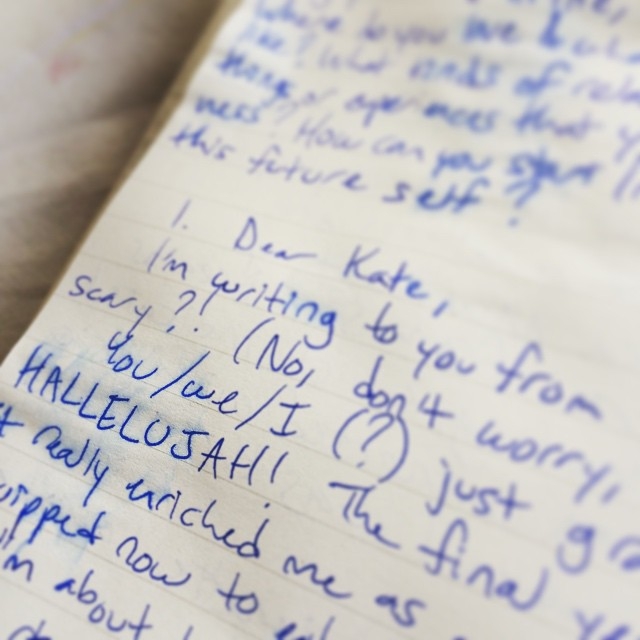
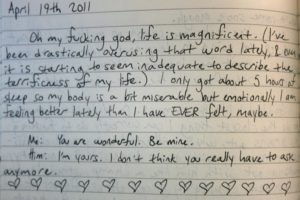 Journal entries. I’ve
Journal entries. I’ve 